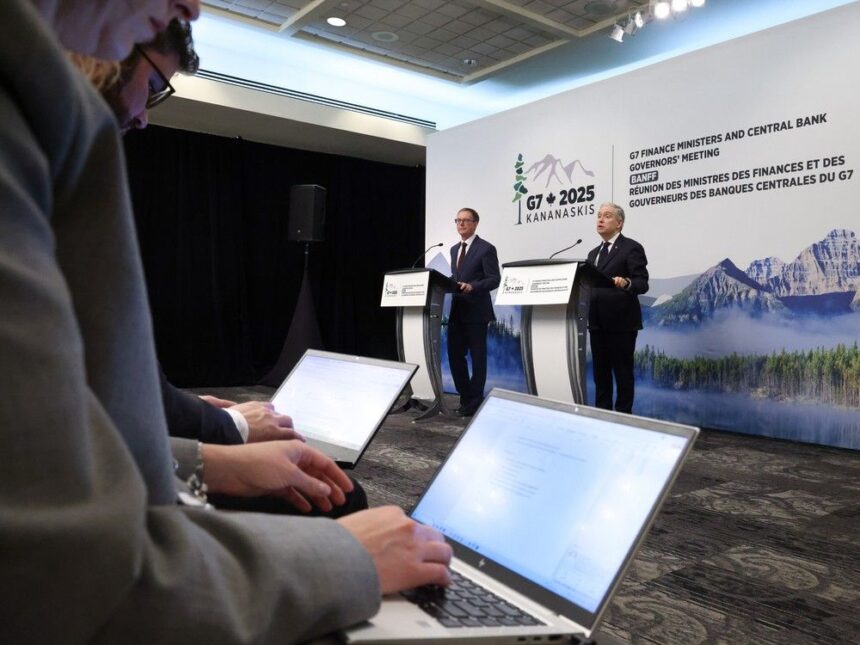The mountain backdrop of Banff played host to some heavy financial discussions this week, as the world’s economic powerhouses gathered just a short drive from Calgary. As someone who’s covered dozens of high-profile political gatherings over my years reporting in Alberta, this one carried particular weight given the global tensions currently at play.
Walking through the Fairmont Banff Springs Hotel yesterday afternoon, I noticed the heightened security presence that always accompanies these international summits. The historic “Castle in the Rockies” provided a stark contrast to the modern geopolitical challenges being discussed within its walls.
Finance ministers from the G7 nations – Canada, France, Germany, Italy, Japan, the United Kingdom, and the United States – emerged from their meetings with a unified message: continued financial support for Ukraine remains non-negotiable despite mounting fiscal pressures back home.
Canada’s Deputy Prime Minister and Finance Minister Chrystia Freeland, who hosted the summit, emphasized the moral imperative driving their decisions. “This is about standing firm against aggression that threatens the rules-based international order,” Freeland told reporters during the closing press conference.
What caught my attention was the practical approach being discussed. Rather than vague promises, ministers focused on leveraging frozen Russian assets to generate approximately $50 billion in loans for Ukraine’s immediate needs. U.S. Treasury Secretary Janet Yellen described this approach as “both legally sound and fiscally responsible” during her address.
The timing of this summit isn’t coincidental. With Ukraine’s economic situation growing increasingly dire after more than two years of invasion, the International Monetary Fund recently projected the country needs roughly $486 billion for reconstruction efforts – a staggering figure that would strain even the wealthiest nations.
Local economic experts I’ve spoken with here in Calgary see the significance extending beyond Ukraine itself. “This represents a test case for how democratic nations respond to economic warfare,” explained Dr. Martha Kelley, an international relations professor at the University of Calgary. “The precedents set here will shape global financial responses to aggression for decades.”
The ministers also tackled other pressing issues during their three-day gathering, including artificial intelligence regulation and climate finance – topics that directly impact Alberta’s economic future as our province navigates energy transition.
For everyday Albertans watching these proceedings, the implications might seem distant. However, Bank of Canada Governor Tiff Macklem, who participated in several sessions, pointed out the connection to our daily lives. “Global stability directly impacts Canadian interest rates, inflation, and economic growth,” Macklem noted in comments provided to Canadian media.
The summit’s location in Banff wasn’t lost on participants either. Japanese Finance Minister Shunichi Suzuki remarked that “the natural beauty surrounding us reminds us what we’re fighting to protect – not just territory, but a way of life built on freedom and respect for international norms.”
Behind the official statements, conversations with delegates revealed genuine concern about sustaining public support for Ukraine assistance amid domestic economic challenges. One European finance official, speaking on background, admitted: “We’re walking a tightrope between international obligations and voters worried about their own financial security.”
The Alberta government maintained a relatively low profile during the proceedings, though Premier Danielle Smith did meet briefly with several ministers to discuss energy security issues – a topic that has gained renewed urgency since 2022.
As the ministers departed today, heading to the airport in Calgary, the agreements reached in Banff will now face their true test: implementation. Previous G7 financial pledges have sometimes faltered when confronted with domestic political realities.
For now, the message from Banff is clear – the world’s leading economies remain committed to Ukraine’s defense and reconstruction, even as the economic costs continue to mount. Whether this resolve holds through the coming winter and beyond remains the critical question that no mountain retreat, however inspiring, can fully answer.







